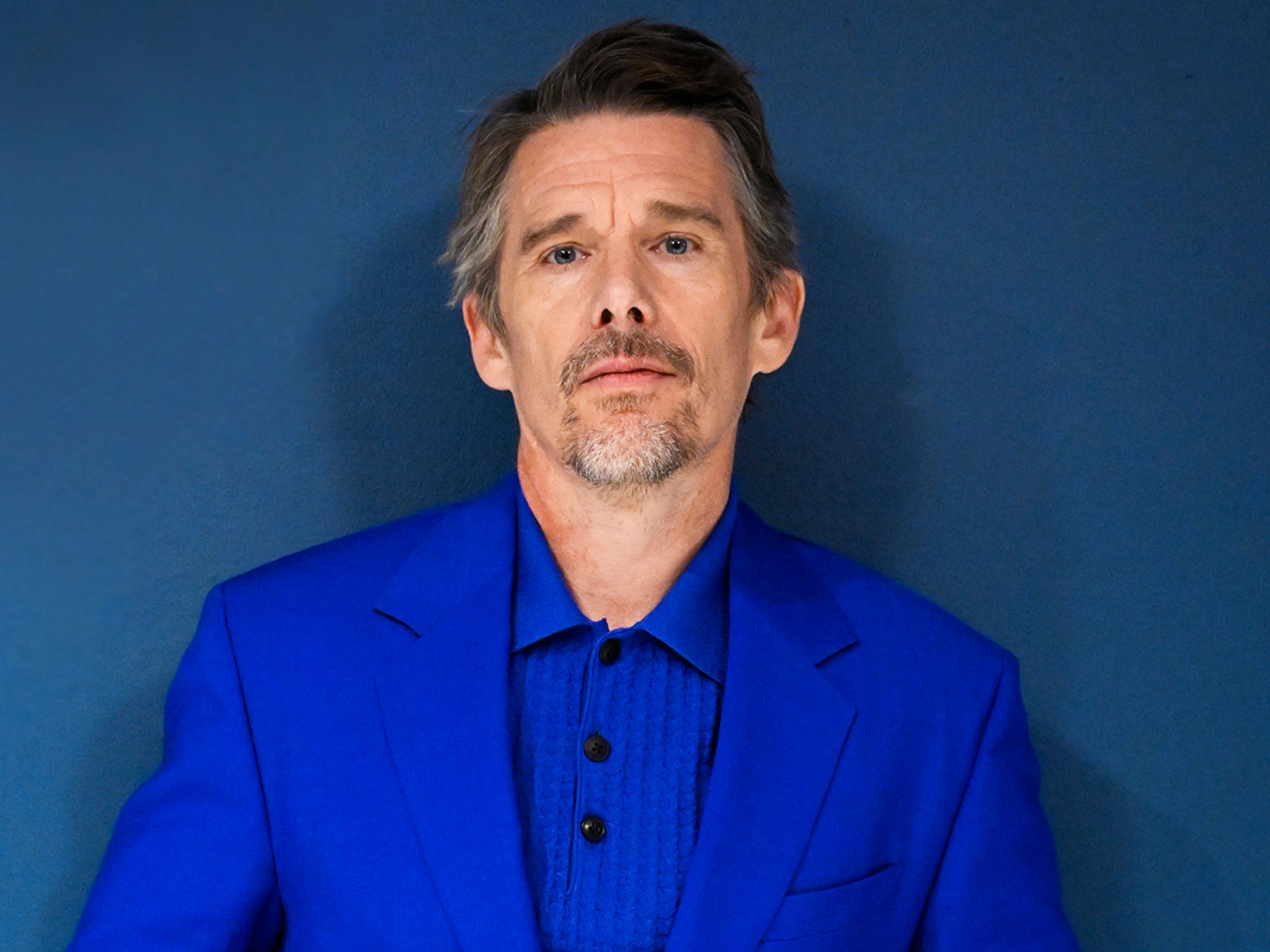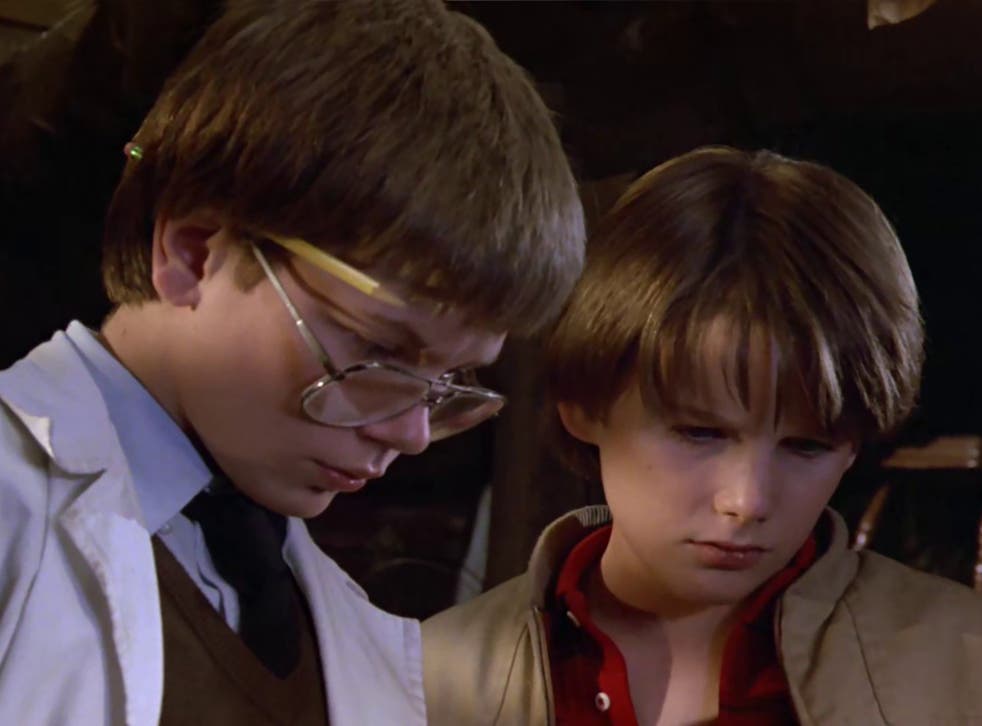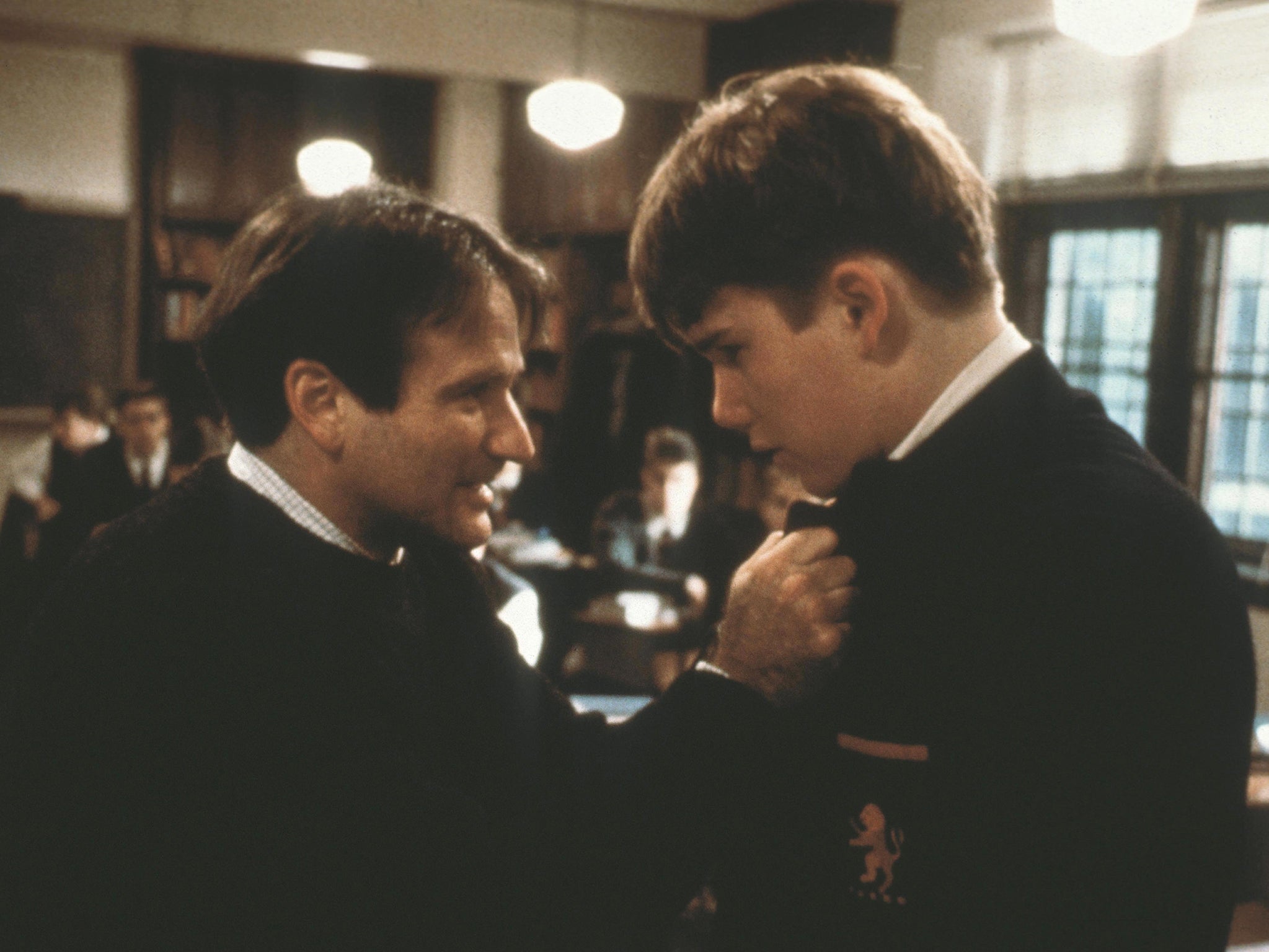Ethan Hawke: ‘There are plenty of successful people who are total failures as human beings’
The king of Gen X indie cinema has pulled off that rare thing in Hollywood: longevity. As he appears to break type in his first Marvel TV show, he gets real with Annabel Nugent about relevance, River Phoenix, and why he’d do another Richard Linklater epic


Can I take off my shoes?” Ethan Hawke is mid-anecdote, relaying a piece of industry advice his eldest daughter Maya gave him, when he reaches down and looks up at me in anguish. “They’re so uncomfortable and I’ll be so much happier if I take them off.” He waits for my go-ahead before wrenching off the black leather Chelsea boots. Hawke – a four-time Oscar nominee and a bona fide, albeit reluctant, movie star – is now in his socks, trying to get the blood flowing back into his feet. He stretches his toes out and digs them into the plush hotel carpet. There, much better.
Hawke is 51 now and has been acting professionally for nearly 40 years. In that time, he’s made it clear that he is more of a Converse dude than a couture guy. Hawke is that rare actor: a prince of Nineties indie cinema who is still around today, still with his trademark goatee. Today, the actor’s face is a prism of the roles that made him a Gen X hero: that permanently furrowed brow calls to mind newbie cop Jake Hoyt (2001’s Training Day). In his lopsided grin lives romantic charmer Jesse Wallace (2004’s Before Sunset), and his endearing snaggletooth? That’s all Troy Dyer, indie heartthrob of 1994’s Reality Bites.
Upon our meeting, I’m pleased to confirm that Hawke is one of five – scratch that, four – Hollywood stars to still have their real teeth. Meanwhile, it’s impossible to witness the gentle downward slope of his eyes without thinking instantly of Todd Anderson, the floppy-haired wallflower he played in 1989’s Dead Poets Society.
In the decades since Hawke made his name as Robin Williams’s baby-faced pupil in the latter movie, he has evolved into a rough-edged actor-slash-everything. His occasional blockbuster moneymakers have always been the least interesting thing about him. Along with a never-ending, always steady string of roles in independent films, he has directed four of his own, written three novels, and co-founded a theatre company. More and more, Hawke operates on the fringes of Hollywood. A Marvel billing, then, is the last place you’d expect to see his name. But there it is: Ethan Hawke as Arthur Harrow in Moon Knight, a Disney Plus production packing a hefty financial punch.
Hawke is just as shocked by his decision to take the part. “It totally surprised me to find myself on a Marvel set,” he says, eyes wide. He doesn’t typically enjoy “having plenty of money and plenty of time” to make a film. “It often leads to this big fear – because you just want everybody to like it. That’s all anyone is concerned about: ‘Are they going to like it?’” The verdict is still out on that one, with the series set for release next week. What swayed him in the end was his daughter Maya and that piece of advice. “My daughter – she’s on the show Stranger Things – she says to me, ‘You’re always talking about wanting people to go to the movies and care about movies. Well, this [Marvel] is what people care about. So why don’t you go make a good one?’”
He says he was given a flexibility and freedom you wouldn’t necessarily expect from a tentpole studio. Moon Knight might be a souped-up sports car with hydraulics and a fresh lick of chrome, but Hawke is the same actor in the driver’s seat. “I tried to go about acting the same way I always do.” To change is a trap, he says. Hawke compares it to going on a date and trying to get someone to fancy you. “It’s pointless. You have to be yourself. If you’re constantly trying to please somebody, you’re never going to know who you are.”
Hawke has known who he is for some time now, despite the world telling him otherwise. “It was hostile,” he says of the reaction to his early ventures in writing and directing. “But you can’t expect everyone to be supportive because they’re really not. And if their lack of support is going to stop you from doing something, then you should probably just stop.”
It’s a ruthless message to aspiring artists, but one that Hawke has abided by. In 1996, he didn’t let the bad reviews of his debut novel The Hottest State stop him from directing a similarly panned adaptation of it. He’s at ease speaking about his perceived “failures”. “There’s always tomorrow to be successful – God willing, right? One of the greatest things you can realise is that failure won’t kill you.” Perhaps it’s thanks to Hawke’s acting training, or the simple fact of his convincing chilled whisper, but the words come across charged with a feeling of newness. Like somehow this isn’t a cliché you’ve heard before.

That’s not to say it doesn’t feel good when people are complimentary, as Hawke is the first to admit. There was the acclaim surrounding his 2020 abolitionist film The Good Lord Bird, as well as Blaze, the biopic he directed and starred in about country musician Blaze Foley. Not to mention his career-high performance as a contrite priest in 2017’s First Reformed. Of course it feels good, Hawke says, when “work that I really believe in is connecting with people. That’s wildly validating and I’d be lying not to admit that, but I try not to give it too much power in my life.” He pulls his knees up and sits cross-legged, fidgeting with the garland of silver rings on his knuckles.
Hawke was 13 when he was cast in The Explorers opposite the late River Phoenix. Joe Dante’s Eighties sci-fi flick was an exciting initiation into filmmaking, but also a baptism by fire in how it feels to fail. The movie bombed. “It taught me to be free from expectations,” Hawke says, smacking his lips at the memory. “If you live your life in service of the arts, you’re going to have a great life. If you expect the arts to be in service of you... like, if you do The Explorers and expect it to be a big hit... you’re going to be miserable. Because no matter how successful or not successful it is, it won’t be enough.”

It’s easy to be rosy-eyed about it now, but at the time, Hawke was crushed. After the New York premiere of The Explorers in 1985, he and Phoenix huddled in the toilets of the Ziegfeld Theatre and listened to critics slag them off. “It was really hard,” he says. To add insult to injury, Phoenix went on to land a role in Stand By Me that Hawke had auditioned for. “The worst part of it was, River called me to tell me how sorry he was that I didn’t get the part. He didn’t know that I didn’t know yet, so I found out from him!” Hawke laughs.
While Phoenix’s career was blossoming, Hawke’s appeared to be withering before it had had a chance to begin. “I was envious. Of course, I was envious. River was gracious and kind, which made it worse. I wanted it to go to his head, for him to be awful or something.” But through his friendship with Phoenix, Hawke realised something: “There is no one pie. Somebody else getting a piece doesn’t mean you’re not getting a piece. Him being great made the art form better, and that made me better. You realise what a waste of time the green-headed monster is.”
A second defining moment came in 2001, when he was cast opposite another of his heroes in police melodrama Training Day. “Working with Denzel Washington, he has this confidence level,” says Hawke. “You wonder where that comes from. It’s experience, but there is also an internal kind of belief system he has. And once you see it and feel it... I realised I could move through the universe like that, too. I didn’t have to be timid and scared.”
As the years go on, there is one feature of Hawke’s face that continues to be prominent: his forehead ridge. That vertical groove, which perfectly splinters the halves of his face, has become an indispensable tool in Hawke’s acting, denoting pain, longing, befuddlement in a single movement. As one Vulture writer put it, “The devil works hard but Ethan Hawke’s forehead crease works harder.” It’s with time that directors have found increasingly interesting ways of using that crinkle.
“It’s a weird riddle,” Hawke says about ageing in his industry. “You start getting asked to play complicated people. You don’t have to play the ingenue parts. The job isn’t about being good-looking any more. But there just aren’t as many parts, because movies and the entertainment industry are geared towards young people – you just don’t realise it when you’re young, because they’re geared towards you. So the good news is, the opportunities get better. The bad news is there aren’t as many of them.” And that’s before we even get to what it’s like for women.

By the time he was 18, and Dead Poets Society became an instant hit, Hawke was already wary of fame. He was patient enough to sidestep the trappings, a quality he credits to his mother’s book recommendations. She gave him autobiographies of the British thespians Alec Guinness and Laurence Olivier, who had long and varied careers defined by peaks and troughs. “At a young age, I was already thinking about what a career looked like, rather than what today looks like. And if you can see that larger plan, you can be a little bit more patient,” he says.
The life of a child star scared him. Hawke compares it to being preserved in formaldehyde. “They stop growing because they want to stay the thing you like, to freeze exactly the way they are,” he says. “It’s most hurtful, usually, with women, but they do the same thing with men.” It wasn’t until he was 24 and Reality Bites came out that he “entered the danger zone”, as he puts it. “Luckily, I was surrounded by good friends at varying degrees of success, so I never really equated professional success with success as a person. There are plenty of people who are successful in their professional life that are total failures as human beings.”
It’s difficult for me to watch ‘Before Sunrise’ now
Perhaps another reason why time concerns Hawke so specifically is owing to his decade-bridging collaborations with the director Richard Linklater: The Before trilogy, which spanned 27 years, and Boyhood, which was shot in a mere 12. When Hawke first sported a ratty red turtleneck in the 1995 film Before Sunrise, the border between himself and his character was already wafer-thin. Jesse was talky, a rugged romantic prone to philosophical musings on reincarnation; the slim window viewers were afforded into Hawke’s life via tabloid stories and interview clippings painted a similar picture of the actor himself. But if there had been any veil of artifice in Before Sunrise, it was torn away in its two sequels, co-written by Hawke and his co-star Julie Delpy, that were released in 2004 and 2013.
Between the second and third instalment, Hawke split from his wife, the actor Uma Thurman. The dissolution of their relationship, that raw extreme of human experience, was something Linklater encouraged Hawke to put on screen. “It was really nerve-racking to do,” he recalls. “It was scary. Rick was really interested in blurring the line between character and actor in order to give the film a subconscious. We put a lot of ourselves into those movies.”
With nine years between each, the three films are important markers in Hawke’s life. “There’s a lot of myself and my reality in those movies. They’re as deeply connected to me as anything could be,” he says. “I can’t look at Before Sunrise now without remembering, so vividly, that time period. Who I was then is so different from who I am now; it’s difficult for me to watch it and exorcise it from my actual life.” But at the same time, Hawke says he’s just as “ready to work with Rick again, to do that same thing” and make another long project together. Bring on the emotional wreckage, his career seems to say.

When Hawke turned 40, he suffered a serious bout of stage fright, seemingly brought on by the milestone he had reached. “Because I was so young when I started [acting] there was this feeling of being a protege, an apprentice. It was a very exciting place to be. But then there comes this feeling that you’re supposed to have arrived at some level of ‘wisdom’ or accomplishment and I didn’t feel I possessed that – and yet my amateur status was being taken away. And so it created that – ” He slams his fist into an open palm a couple of times, trying to find the words. “That. That. That block. You have to really break through the seam and start to not care again.”
His role in Moon Knight isn’t the surprise it initially appears to be. For decades now, Hawke has wrestled with the opposing ideas of art and commercialism. Look at his credits: indie fare like Born to Be Blue and Before the Devil Knows You’re Dead sit next to major movie productions like Sinister and The Purge. “Rick [Linklater] has this saying, ‘You got to pay to play’, and it’s true,” says Hawke. “If you keep making weird movies that no one sees, you won’t be making them very long.”
He uses Blaze as an example: “You can’t get a film like that financed unless you have some level of success.” Notions of “purity” don’t concern Hawke like they used to. Right now, he is working on a documentary about Sixties golden couple Joanne Woodward and Paul Newman. “Here was this giant international luminary, but he was still extremely pure. Bob Dylan, too.” It seems the most earnest man in Hollywood is cutting himself some slack. Maybe the dichotomy between art and money isn’t as rigid as Hawke once thought. Maybe it’s possible to be a hotshot movie star with an artist’s soul. If it’s possible for Paul and Bob, why not Ethan?
‘Moon Knight’ will begin on Disney Plus on Wednesday 30 March. Episodes will be released weekly through to the start of May
Join our commenting forum
Join thought-provoking conversations, follow other Independent readers and see their replies
Comments


Bookmark popover
Removed from bookmarks